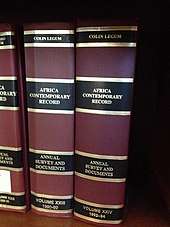Colin Legum
Colin Legum (3 January 1919 – 8 June 2003) was a South African journalist and writer on African politics. A popular author, he was authored several popular books and worked for most of his career at The Observer in the United Kingdom. He was a notable Anti-Apartheid activist.
Colin Legum | |
|---|---|
| Born | 3 January 1919 |
| Died | 8 June 2003 (aged 84) |
| Occupation | Journalist and writer |
| Spouse(s) | Eugenie Leon (m. 1941–1960) |
Biography
South Africa, 1919–49
Colin Legum was born on 3 January 1919 in the rural settlement of Kestell in the Orange Free State, Union of South Africa. His parents were Lithuanian-Jewish immigrants who ran a local hotel. He was brought up by a Sotho nurse and "felt deeply about the injustice of the treatment of the local black population" and the poverty of local whites.[1] Although strongly attached to South Africa, he was politically sympathetic to Zionism.[2]
Legum left for Johannesburg at the age of 17 and found a job as an office boy at the Sunday Express where he quickly became a reporter, dealing with political news.[1] He joined the South African Labour Party and became the editor of its newspapers Forward and The Mineworker, eventually becoming party general secretary. He was elected to Johannesburg City Council in 1942 where he was responsible for housing.[1][2] He married Eugenie (née Leon) in 1941.[2]
United Kingdom and the Observer, 1949–91

Legum left South Africa for the United Kingdom in 1949 as the newly ascendant National Party of F.S. Malan began to construct the system of Apartheid.[2] Legum gained a prestigious job on The Observer through a personal contact with David Astor who, like Legum, also opposed South African policy.[2] Legum became one of the first British journalists specifically focusing on African issues and he remained involved in South African politics. He co-authored his first book Attitude to Africa (1952) with Michael Scott and other activists and was part of the Africa Bureau run by Scott and Mary Benson which campaigned for reform in South Africa.[2]
Legum remained with the Observer for most of his career, eventually becoming the paper's associate editor.[2] He published several popular works on African subjects during the era of decolonisation, including Congo Disaster (1961) and Pan-Africanism: A Brief History (1962). He became friends with several leading African nationalist leaders, notably Julius Nyerere, Seretse Khama, and Oliver Tambo.[2]
He married the economist Margaret (née Roberts) in 1960 after the death of his first wife. They co-authored South Africa: Crisis for the West (1964) which was the first call for economic sanctions against Apartheid South Africa.[2] He was banned from South Africa in 1962 and later from Rhodesia.[2] He established the annual Africa Contemporary Record in 1968.[2] His last book was Africa Since Independence (1991).
South Africa, 1996–2003
With the collapse of the Apartheid state, Legum returned to South Africa in 1996 and settled in Kalk Bay, near Cape Town. He received honorary degrees from Rhodes University and the University of South Africa.[2] He died on 8 June 2003, aged 84.
References
Bibliography
- Vigne, Randolph (10 June 2003). "Colin Legum: Fleet Street's First Africa Correspondent". The Independent. Retrieved 30 March 2020.
- Shaw, Gerald (9 June 2003). "Colin Legum: The Observer's man in Africa, he was the leading analyst of the continent's affairs". The Guardian. Retrieved 30 March 2020.